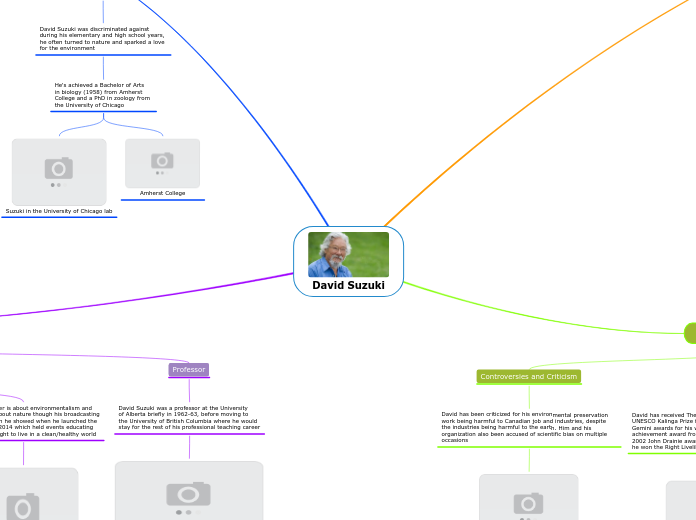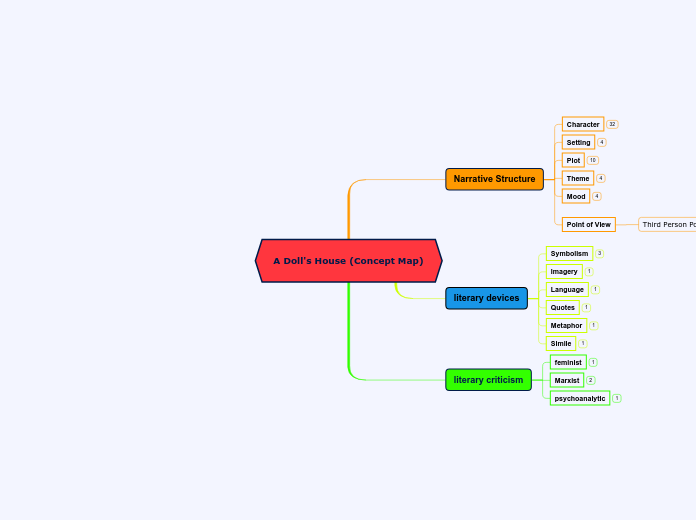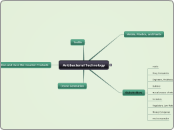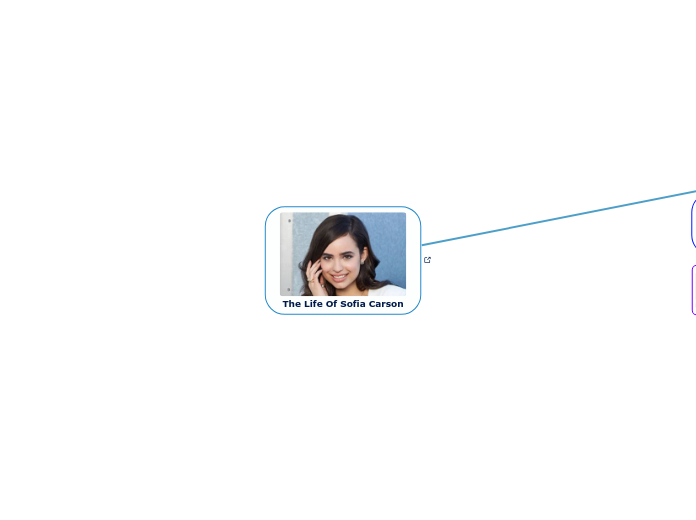David Suzuki
Careers
Professor
David Suzuki was a professor at the University
of Alberta briefly in 1962-63, before moving to
the University of British Columbia where he would
stay for the rest of his professional teaching career
University of British Columbia
Environmentalist
David's entire career is about environmentalism and
educating others about nature though his broadcasting
and teaching, which he showed when he launched the
"Blue Dot Tour" in 2014 which held events educating
people about the right to live in a clean/healthy world
Despite him having multiple careers, environmentalism
has always been his main passion and focus. David has
an environmental charity called the "David Suzuki
Foundation" that works to "address the problems of
biodiversity loss, climate change, and community well
being by working with nature rather than against it"
British Columbia (where
David lives)
Scientist
Suzuki won a "Steacie Memorial Fellowship for
being the best young Canadian scientist in 1969,
David worked and taught in multiple fields but
was best known for his work on meiosis, mutations
caused by temperature change, and the genetics of
fruit flies
Broadcasting
In 1971-72 he was the host of "Suzuki on Science
which began to make him a public figure, followed by
the 1974 show Science magazine, and a year later he was the
first radio host of Quirks and Quarks. In 1979 David left
both of those programs and moved onto "The Nature of
Things with David Suzuki" which is still running to this day
and has become the longest running documentary series on CBC-TV. He's also been apart of creating multiple environmental documentaries among many other projects over the years and recently
Who Is He?
Education
David Suzuki was discriminated against
during his elementary and high school years,
he often turned to nature and sparked a love
for the environment
He's achieved a Bachelor of Arts
in biology (1958) from Amherst
College and a PhD in zoology from
the University of Chicago
Amherst College
Suzuki in the University of Chicago lab
Early Life
During WW2 his family was moved
to an internment camp since they
were seen as Japanese enemies
After the war (1945-50) his family was forced
to leave the BC, they settled in Ontario
being one of the only visible minorities
David and his family
(David with his siblings in the camp)
His Positives and Negatives
Honours and Awards
He has 29 honorary degrees from universities in Canada, the USA and Australia, became an order of Canada companion in 2005, a Canadian walk of fame member, he even has a Peel District School Board High school named after him, among many others
David with his star on the
Canadian walk of fame
David has received The 1986 Royal Bank Award and the UNESCO Kalinga Prize for the Popularization of Science, 5 Gemini awards for his work on Canadian TV, the lifetime achievement award from the University of BC in 2000, the 2002 John Drainie award for broadcasting excellence, in 2009 he won the Right Livelihood Award, and many other awards
David Suzuki receiving his
Right Livelihood Award
Controversies and Criticism
David has been criticized for his environmental preservation work being harmful to Canadian job and industries, despite the industries being harmful to the earth. Him and his organization also been accused of scientific bias on multiple occasions
The Alberta tar sands that
David Suzuki suggested be
shut down
What Does He Want?
Nature Based Solutions For;
Community Well-Being
Another way David wants to help the environment is by "addressing societal challenges effectively and adaptively" as well as being able to "provide human well-being and biodiversity benefits"
Climate Change
These tactics help to solve issues sustainably and according to his charities website "decrease the risk of exacerbating one crisis while dealing with another"
Biodiversity Loss
David wants to "protect, sustainably manage, and/or restore natural or modified ecosystems". Essentially he wants to restore broken and dying habitats/ecosystems for the health of the planet
Environmentalism
David Suzuki has had a strong passion for nature
ever since he was kid, when he was lonely nature
was there for him, so know he's there for nature
with his various environmental conservation projects









